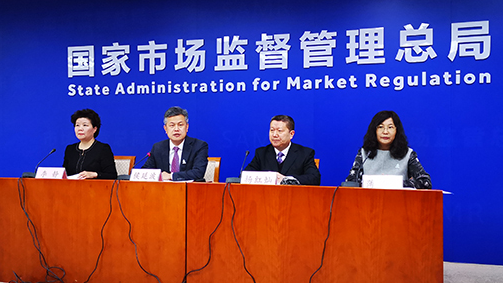
The gala event for Alibaba Group's annual online shopping event starts in Hangzhou, China, November 11, 2020. /Getty Images
The gala event for Alibaba Group's annual online shopping event starts in Hangzhou, China, November 11, 2020. /Getty Images
Editor's note: Wu Peicheng is a Ph.D. candidate in law at Shanghai Jiao Tong University and UNSW, Sydney. He used to intern in the Supreme People's Court of the PRC. The article reflects the author's opinions and not necessarily the views of CGTN.
China has experienced rapid development of the digital economy in recent years. There are many digital companies in China, such as Alibaba, Tencent, Baidu, JD.com, Meituan and Didi.
Chinese consumers are accustomed to all kinds of e-commerce platforms and products these undertakings provide.
These digital platforms enable Chinese people's daily life more efficient and convenient. However, what these e-commerce firms do has raised many anti-competitive concerns recently.
For example, some e-commerce platforms require the operators to choose only one platform to do business (the "one out of two" practice). Such behavior might harm other platforms and eventually limit the choice of consumers.
On November 10, the State Administration for Market Regulation of the PRC (SAMR), the Chinese authority to regulate market competition, issued the Anti-Monopoly Guidelines for the Platform Economy (draft) (Guidelines) in order to receive public comments. This was the first time that SAMR clearly recognized that the anti-monopoly law (AML) should apply to a digital economy and e-commerce platforms when necessary.
Although China's AML has been in effect for over ten years, the Chinese competition agency barely takes any investigations into e-commerce platforms.
Some may argue that platforms are still growing, and the AML should not intervene in their operations unduly. Therefore, for a long period, Chinese market competition regulators have taken a "tolerant but cautious" approach to the intervention of the platform economy.

China's State Administration for Market Regulation holds a press conference in Beijing, China, November 10, 2020. /Xinhua
China's State Administration for Market Regulation holds a press conference in Beijing, China, November 10, 2020. /Xinhua
The release of the Guidelines indicates the latest viewpoints of SAMR to regulate e-commerce platforms. Here are some highlights in the Guidelines following, which could guide the future anti-monopoly investigations of these platforms in China.
Firstly, the Guidelines clarify that the framework and principles of the AML should apply to all undertakings in the e-platform economy. It means that digital companies have to follow the rules of the AML and cannot abuse their market dominance to deter consumers' interests.
To this end, the Guidelines require Chinese competition regulators to enhance and promote anti-monopoly investigations of platforms. Meanwhile, they need to pay more attention to the practices of platforms that have anti-competitive impacts during anti-monopoly investigations.
Secondly, the Guidelines try to solve several typical abusive practices a platform may conduct. For instance, the Guidelines identify the "one out of two" practice conducted by a dominant platform as a category of prohibited unilateral practices.
If a dominant firm refuses to supply its own platform or big data to competitors, particularly when they constitute "essential facilities", SAMR is likely to find the company abusing market dominance.
Moreover, the Guidelines evidently forbid dominant platforms from using Big Data analysis to price products to the disadvantage of existing customers. In other words, the dominant platforms are no longer allowed to impose varied prices for the same product or service based on different consumers.
Last but not least, aside from applying the basic principles of the AML, the Guidelines also take into consideration some special elements of e-commerce platforms.
For example, when handling abuse of dominance cases, the Guidelines, in principle, follow the traditional approach to defining a relevant market, identifying market power, and assessing the abusive practices.
Notwithstanding this, sometimes it would be difficult to define a precise, relevant market in the platform economy because the digital economy is more dynamic than traditional industries.
As a result, the Guidelines stipulate that if there is sufficient direct evidence showing that the abusive practices lead to serious anti-competitive practices, the market regulation authority can determine the abuse of market dominance without making a market definition.
Over the last few years, the U.S. and EU competition regulators have investigated a few platform companies, such as Facebook, Google, and Amazon, for disobeying competition laws.
By contrast, the Chinese competition regulator took a more cautious approach to this. The issuance of the Guidelines is a signal that the Chinese government is prepared to implement the AML in the digital economy.
The Chinese government has made it clear that competition policy plays a fundamental role in the socialist market economy. Undertakings in the market, no matter e-commerce platforms or traditional industries, all should follow competition rules and respect the implementation of the AML.
It can be expected, with the release of the Guidelines, Chinese competition regulators will take more active measures to investigate illegal anti-competitive practices in the platform economy, taking the characteristics of platforms into account at the same time.
(If you want to contribute and have specific expertise, please contact us at opinions@cgtn.com.)

